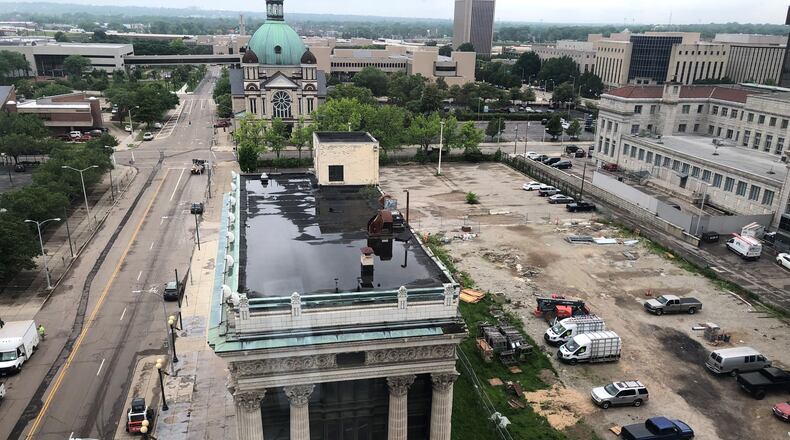With the rehabilitation of the Dayton Arcade, the opening of the Levitt Pavilion Dayton and the planned renovation of the Grant-Deneau Tower and Dayton Convention Center, developers and property owners see the promise of a connected and vibrant downtown, said Amy Walbridge, Dayton’s downtown development coordinator.
“We’re excited about all the development that’s happening in the core and the southern quadrant of our downtown,” said Scott Murphy, vice president of economic development with the Downtown Dayton Partnership. “More than $200 million is currently under construction or in the development pipeline within two blocks of Main Street.”
Attorneys for the owner of the Fourth and Ludlow building and a potential buyer have been in talks for months, and the interested party has made a few offers for it that were rejected but were later revised, said Ron Smith, a broker and listing agent with HER, Realtors. The Dayton Daily News has not owned the building in almost a decade.
Smith said he updated the online listing of the four-story building to “under contract” because an agreement could be signed fairly soon.
There were quite a few inquiries about the building, particularly from out-of-state individuals and groups, Smith said, but many lost interest when they learned it was not occupied or connected to utilities.
The 18,000-square-foot building is listed for sale for more than $1.1 million. Built in 1910, the building has been vacant since early 2007.
Steve Rauch Inc., which is associated with a local demolition company, owns the building. Rauch received it after reaching a deal with its former owner, Student Suites, to end a dispute over unpaid demolition expenses.
Student Suites planned to build new housing at the property, but that project fell apart.
The city of Dayton has long sought a new developer to transform the rest of the surrounding vacant site and incorporate the former newspaper building into the project.
This year and last, the empty land around the Fourth and Ludlow building was used as a construction staging area to support the Arcade’s rehab.
The South Main Street corridor in downtown Dayton is undergoing a significant transformation.
The Levitt Pavilion Dayton, a free live music pavilion at East Fifth and South Main streets, opened in late summer of 2018 and has brought large numbers of people to what was a tired area and an underutilized park.
The Dayton Arcade, at West Fourth and South Ludlow streets, opened last year with $90 million in new investment after a 30-year hibernation.
The University of Dayton and the Entrepreneurs’ Center are the anchor tenants, and the arcade’s private offices and apartments are completely occupied.
The developers are moving ahead with the next phase of the project focused on the northern portions of the nine-building complex.
Just south of the arcade, the 22-story Grant-Deneau Tower is being renovated for a mix of uses, possibly including residential units, hotel rooms, upscale offices and food and beverage space.
Windsor Companies, the owner and developer, plans to invest about $42 million into the empty office tower, said Alex Dorsey, founder and CEO of the Windsor Companies.
Demolition inside the property has started, and design work is almost complete, he said.
Dorsey said the Arcade project was a catalytic investment in the southwest part of downtown.
“Windsor was excited to see the first few phases get completed and action on the streets,” he said. “Our goal is to have (Grant-Deneau Tower) be another core designation to support the ecosystem we envisioned from the beginning.”
The Dayton Convention Center, just south of the Levitt Pavilion, will undergo more than $30 million in renovations to refresh the aging facility.
These projects are building confidence in the area, and there is redevelopment interest in nearby buildings, including the Centre City building, just north of the Levitt Pavilion.
Five to six years ago, there were no developers interested in properties along South Main Street, south of Third Street, Walbridge said.
But civic investments, including the pavilion project and upcoming convention center project, helped build the private-sector’s confidence, she said.
Investment in the core of downtown is important for the whole city’s economy, said Murphy, with the Downtown Dayton Partnership.
“Most of downtown’s 21,000 employees are based in the central business district, and these employers generate the income tax revenue that supports growth across Dayton,” he said.
About the Author


